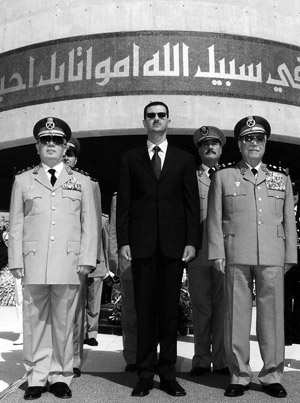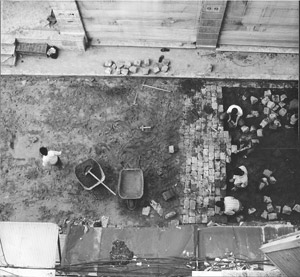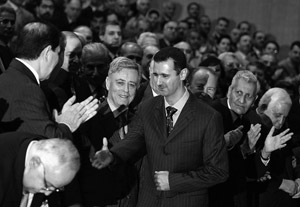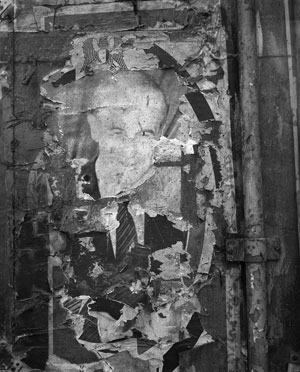Syria’s Curious Dilemma
Bassam Haddad
(Bassam Haddad teaches political science at St. Joseph’s
University in Philadelphia.)
|

Syrian President Bashar al-Asad stands with then
Defense Minister Mustafa Tlass (right) and Hasan al-Turkmani,
chief of staff, as they visit the tomb of the unknown soldier
in Damascus, October 6, 2002.
(Reuters/SANA/Landov) |
Seasoned observers of Syria have learned not to make much of
apparent political changes in the country. This lesson holds true
today, but with a twist.
Five
years after the death of Hafiz al-Asad, who ruled Syria for 30
years, a series of “springs” have come and gone without
substantially opening up the political system. The country’s
political institutions are stable, but stagnant, including the
governing Baath Party, which continues to rule by periodically
reshuffling elites. Syria’s economy continues to sputter, its small
oil reserves continue to dwindle and its work force continues tolag
in acquiring the skills needed in today’s global economy. Perhaps
the most troubling part of Syria’s predicament is an invisible but
rising wave of poverty unprecedented in recent history.
For
Syria’s political elite, this precarious state of affairs is not
unusual. Nor is it beyond the wherewithal of the awkward, yet
maturing new leadership around President Bashar al-Asad to deal with
adversity. What has changed rather decisively is the world around
Syria’s cocoon. Coupled with domestic woes, this change does
challenge the abilities of the regime. Violent regime change in
Iraq, the humiliating loss of Syrian control in Lebanon and a
strident Israel emboldened by a duplicitous “war on terror” have
combined to isolate Syria and to diminish its regional influence.
The results of negotiations with the European Union to bring Syria
into a “partnership agreement,” as part of the EU’s “Barcelona
process” of Euro-Mediterranean economic integration, have been
disappointing. To make things worse, the Bush administration, backed
by Congress, persists in pursuing an unprincipled anti-Syria
campaign whose endgame remains difficult to divine.
In
2005, Syria finds itself bereft of foreign policy tools whose
advantages it enjoyed for over 30 years. Between 1970 and 1990, the
Syrian regime benefited from the superpower competition of the Cold
War. With the dissolution of the Soviet Union in 1990, Damascus
relied on playing a regional role, beginning with its participation
in the US-led coalition to expel the Iraqi army from Kuwait in 1990.
Now, the international and regional fronts are both closed, and the
Syrian regime is left with a lone front on which to fight for its
viability: at home. The domestic front is where the regime has
historically been most vulnerable.
Barring unforeseen developments, the Syrian regime faces
what, by its lights, is a curious dilemma: either it acquiesces to
the demands of external forces in order to preserve itself or it
compromises its domestic position by allowing the diffusion and
decentralization of power. Does the Syrian regime have the skill and
the willpower to escape from this hornet’s nest? Can the regime
manage today’s domestic, regional and international crises all at
the same time? Judging by the outcome of the Baath Party’s recent
Tenth Regional Conference, one should not hold one’s
breath.
Back to Basics
|

Aleppo from above. (Issa
Touma) |
The
Tenth Regional Conference, held in early June 2005, was a bit of
housekeeping in preparation for an entrenchment. It saw the apparent
consolidation of Bashar al-Asad’s rule at a time when significant
external and internal tensions and threats are coinciding for the
first time since the 1960s. According to Ibrahim Hamidi, perhaps the
most informed and incisive journalist in Syria today, “The message
that the Regional Baath Conference wanted to send at the end of the
conference to public opinion, the opposition and foreign
actors—especially America—is that the Baath Party will remain the
ruling party in Syria.”[1]
Very
little was said at the conference about foreign policy, beyond
affirmation that peace will remain Syria’s “strategic choice” and
that the regime will work to enhance its bargaining position
vis-à-vis Israel. Indicating the regime’s domestic focus, Bashar
emphasized that “any decisions or recommendations made during the
conference should express our internal needs only, in isolation from
any other considerations aimed at pushing us in directions that
contradict our national interest or threaten our stability.”[2]
The
conference was not without positive developments, though these were
hardly far-reaching reforms. Expanding space for political
participation was a recurring theme. For the first time, there were
serious recommendations that the state should review the Emergency
Law in place since 1963, with an eye toward “narrowing the scope of
state security matters.”[3] A new “political parties law” is likely to
take effect soon,[4] though Article 8 of the constitution,
designating the Baath Party as the “leader of state and society,”
will remain untouched. Reiterating a stock line, a high-level
official told the pan-Arab daily al-Hayat that modification
of Article 8 is an “external request” made by non-Syrian interests.
This statement is related to various proclamations during the
conference regarding the need to “lay bare” the intentions of the
expatriate opposition, particularly the Muslim Brotherhood
leadership in exile in Paris, on the grounds that they are not true
“nationalists” and are being supported by actors hostile to Syria.[5] Another likely subject of this denunciation is
the Reform Party of Syria led by Washington-area dentist Farid
Ghadry, a would-be Syrian Ahmad Chalabi who is being promoted by the
neo-conservative think tank, the Foundation for the Defense of
Democracies.
In
various interactions, formal and otherwise, Bashar emphasized that
“the party does not own the state.”[6] It is necessary, he said, “to redefine the
relationship of the party to political power, and not to be enmeshed
in daily politics, and to move away from office work and focus on
interacting with the masses.”[7] Henceforth, the Baath’s share of cabinet posts
will be limited to ten.[8] Nonetheless, it was stipulated toward the end
of the conference that the prime minister and the speaker of
parliament must be members of the Baath’s ruling body, the Regional
Command, creating an obvious contradiction between proclamations and
practice, and eliminating the possibility that a high-level
executive such as the prime minister may be an
independent.
It
was also suggested that the Regional Command of the party be
dissolved and replaced by the “Party Command.” Hence, President
al-Asad would become the secretary-general of the Baath Party, not
the regional secretary. This move would facilitate the dissolution
of the National Command of the party in the near future.[9] Although the party did not act on this
suggestion at the conference, it is likely to do so in the future.
In any event, the number of members in the Regional Command was
dropped from 21 to 14. It is also significant that there were forces
calling for replacing the slogan “unity, freedom, socialism” with
“democracy and social justice,” and the name Arab Socialist Baath
Party with simply the Baath Party, thereby toning down the socialist
identity of the party and introducing the magic word “democracy.”[10] These changes did not occur, but talk of
them provides clues to the regime’s longer-term thinking.
The Nitty Gritty
|

Bashar al-Asad shakes hands with party members during
the opening of the Baath Party Regional Congress in Damascus,
June 6, 2005. ‘Abd al-Halim Khaddam, then still vice
president, is seen smiling next to Asad. (Ramzi
Haidar/AFP) |
It
is no secret that Syria’s real strongmen sit at the helms of General
Security, Military Security and the Republican Guard. Changes and
replacements at that level tell a more direct story about the
regime’s internal power dynamics than hundreds of pages of party
declarations and memoranda. One week after the conference, Bashar’s
brother-in-law Asef Shawkat was confirmed as the head of military
intelligence, perhaps one of the most sensitive and powerful
positions in Syria today. Manaf Tlass, son of former Defense
Minister Mustafa Tlass, and Bashar’s brother Mahir are the effective
heads of the Republican Guard, perhaps the most potent fighting
force in Syria. The implications here might appear clearer than they
are, for family ties to Bashar do not guarantee loyalty, as the
history of struggle for power in Syria instructs.
More
important is the evident “clearing of the way” that has taken place
within the predominant institutions of coercion in the country since
Hafiz al-Asad’s death. Over the past five years, strongmen who are
either opposed to Bashar or are not part of his “team” have been
gradually either replaced or “retired.” They include former Chief of
Staff ‘Ali Aslan and his deputies ‘Abd al-Rahman al-Sayyad, Faruq
Ibrahim ‘Isa, Ibrahim al-Safi, Shafiq Fayyad and Ahmad ‘Abd al-Nabi,
the head of the political security branch of General Security,
‘Adnan Badr Hasan, and Hasan al-Khalil, Shawkat’s predecessor as
head of military intelligence.
Perhaps the most visible development at the Regional Baath
Conference was the replacement within the Regional Command of what
remains of the “ old guard” that surrounded Bashar’s father[11] with a “new” team.[12] A charter member of the old guard, ‘Abd
al-Halim Khaddam, “resigned” as vice president and as a member of
the Regional and National Command Councils after sensing the
isolation of the “older” Baathists. As Khaddam is perhaps the second
most visible icon of the Baath regime after Hafiz al-Asad, the
nature of his exit—which was not “honorable”—bespeaks the end of an
era. The circumstances surrounding his exit lend credence to the
little-discussed story that Khaddam and others among the old guard
formed an informal alliance aimed at “saving” the regime from what
they perceive to be the current leadership’s blunders in Iraq and
Lebanon.[13]
Khaddam’s departure completes the process of paving the way
for Bashar that started in June 2000. The new team is made up of
both older and younger Baathists who are distinguished by their
proximity to the current leadership, and not necessarily by their
skill or experience. It is said that this team is important not for
what it will do for Syria, but for what it will not do: obstruct
decisions made by the top leadership. For the regime, the new team
is a double-edged sword. On the one hand, its unquestioning loyalty
will make for a less erratic policy. On the other hand, the new
Command leadership lacks vision and, many say, competence. It
remains to be seen which edge of the sword will strike. If the new
team is a short-term fix to rid the leadership of troublemakers,
then it could enable a smoother and surer decision-making process in
the future. However, if the desired end is to surround the
leadership with complacent figures in perpetuity, then it is
probable that Syria will return to square one, with the leadership
approaching a stifling absolutism of sorts. In any event, Syria’s
principal dilemma leaves little room for the long-term
sustainability of such a formula.
Institutionally speaking, Bashar and his closest allies have
played a delicate game to consolidate their control. On the one
hand, they needed to preserve the structure of executive authority
by strengthening the party and government institutions; on the other
hand, they had to manipulate the same authority structure and
institutions that would allow them to limit the personal power of
potential adversaries in the long run. This was not a choice of one
strategy among many on offer: Bashar needed, and needs, the Baath
Party. Since he lacks his father’s charisma, and with the
multiplication of power centers around certain personalities within
the regime, selective reinvigoration of the roles of the party was
the only rational choice.
Another change is increasing reliance on the security
services, as indicated by the shifting membership in the Regional
Command. Historically, the Command included the chief of staff and
the defense minister. After the June conference, two members of the
security services took the spots of these officials in the Command.
It is unmistakable that the security services are continuing to gain
authority in circles that they began to infiltrate in the early
1970s. Finally, the institutional army's clout has been eroded,
particularly after the pullout from Lebanon.
The Balance Sheet
|

Fraying poster of Hafiz al-Asad in Damascus, 2004.
(Thomas Kern/Lookatonline) |
The
transition of regime from Asad senior to Asad junior that began in
2000 (and perhaps earlier) is now complete. Though the new regime is
not impregnable, the intra-party tension and the rocky
decision-making processes that characterized Bashar’s first five
years in power are unlikely to reappear for some time. The evident
winners are Bashar and his team, including the Asad family and their
innermost circle. The evident losers are the old guard, or those who
opposed Bashar’s ascendancy, beginning with formerly powerful Chief
of Staff Hikmat Shihabi, who “retired” in 1998 after he made public
his distaste for the prospect of Bashar ruling Syria, and ending
with Khaddam—with a flurry of others in between.
Digging a little deeper, one finds that the decisive break
was made not only with the old guard, but with the regime of Hafiz
al-Asad, a development that cannot be translated publicly into words
in Syria’s political climate today. Bashar was indeed his father’s
choice of successor, following the death of his oldest son Basil in
a 1994 car crash, but it is questionable whether Asad senior wanted
Bashar to change the regime itself. This is not an academic point,
for with the changes to the regime came changes in the regime’s
style and approach whose contours are still emerging.
In
its handling of the US invasion of Iraq and the aftermath, the
“Lebanon file” after the May 2000 Israeli withdrawal and the US “war
on terror” that linked Syria with “terrorist” groups within Syria
and in Lebanon, the current Syrian regime has contributed to its own
isolation. This isolation is exacerbated by the Bush
administration’s hostile posture. Hafiz al-Asad’s regime boxed
itself in domestically, but was always able to compensate for
problems caused by its centralization of domestic political power by
adopting an uncompromising stance on regional issues—particularly
the Arab-Israeli conflict. Bashar’s regime has been steadily losing
this ability. In the past, Palestinian and Lebanese resistance
movements were used from a distance to prop up the legitimacy of the
Syrian regime. Today, the regime has absorbed these tools as part
and parcel of its legitimacy, thereby compromising its independence
and allowing itself to be more liable for the Palestinians and
Lebanese groups’ possible missteps. In the post-September 11
international climate, where the US, Europe and Israel require no
hard evidence to condemn Syria for any number of alleged
infractions, such a loss of autonomy could subject Syria to many
unneeded blows. One should caution against accepting the common view
in Syria that Asad senior would never have brought the country to
such a point. The Syrian regime has been, and still is, willing to
pay nearly any price to maintain its own security, and the dead end
was always in sight. Asad senior was likely, however, to have
delayed the inevitable a little longer.
The
breathing space that the regime afforded itself by clearing the way
for a less conflict-ridden decision-making process is an opportunity
to embark on irreversible domestic decentralization that would
herald an era of putting development ahead of both regime security
and external demands. Independent, opposition and regime-friendly
observers in Syria will not bet on this scenario. In view of the
Bush administration’s aggressive policy orientation, the smart money
is on a strategy of gradual submission to external demands that may
hurt the wellbeing of the Syrian people, but will keep the regime's
security intact. The same scenario is likely to unfold in the case
of the country’s political economy.
State of the Economy
The
state of the Syrian economy remains dismal. It is unclear whether
the deliberations at the recent Baath Regional Command Conference
reflect the sophistication that is required to deal with the
crisis.[14] Optimists continue to debate whether this or
that liberalization measure is likely to improve the economy as
though the missing link is a “good plan.” The announcement by the
chief of the State Planning Commission in 2004 that Syria will adopt
the principles of a market economy by 2010 brought relief to
optimists.[15] So did the announcement at the Baath
Regional Conference that Syria will adopt a “social market
economy.”[16] But what about the elephants in the room?
Syria’s economy stagnated between 1996 and 2004, with an
estimated average growth rate of 2.4 percent.[17] Meanwhile, the population is growing at a
rate of 2.7 percent,[18] spelling disaster for development. Economic
growth reached 3.4 percent in 2003, but that unusually high rate
reflected the sale of Iraqi oil through Syria and then the rise of
oil prices as a result of the Iraq war. In 2004, economic growth
dropped to 1.7 percent, showing the danger of depending on oil
rents.[19] Oil production reached 591,000 barrels per
day (bpd) in 1995 but declined to 450,000 bpd in 2005. According to
one estimate, Syria will become a net importer of oil for the first
time in 30 years by 2012.[20] The good news for the Syrian regime is that
the rise in natural gas production is likely to compensate for a
substantial part of the decrease in oil production. Gas reserves are
estimated at 240 billion cubic meters.[21] Much depends on the transit revenues that
Syria will receive from the Arab Gas Pipeline linking Egypt with
Turkey and eastern Europe.[22] Ultimately, rent income from oil or gas will
only buy time. Meanwhile, unemployment, poverty, investment and
dilapidated public-sector firms require immediate attention.
Syrians are suffering from an alarming decrease in their
standard of living. In 2003-2004, 5.1 million people (or 30.1
percent of the population) were living below the poverty line, with
2 million Syrians unable to meet their basic needs.[23] By most estimates, there is 20 percent
unemployment in the country, with at least 300,000 new workers
entering the job market each year.[24] According to former State Planning
Commission chief and current Deputy Prime Minister for Economic
Affairs ‘Abdallah al-Dardari, an average annual growth rate of 7
percent will be necessary to provide employment for job seekers.
Where will this growth come from?
With
oil income tapering off, Syria’s public and private sectors must do
the heavy lifting. To generate growth in those sectors, the regime
appears to be counting on the trade benefits of a partnership
agreement with the EU. After some hesitation, and presumably to
break the Syrian isolation imposed by the US, in 2004 Bashar created
a new team to speed up the signing of an agreement. As a
precondition, the EU pressed for a rapid transition from a public-
to a private-sector economy, and, according to former Industry
Minister ‘Isam al-Za‘im, the regime soon found itself moving faster
and conceding more than it wanted to. By the end of 2004, the EU had
added new preconditions, including a call upon Syria to lead the way
in eliminating weapons of mass destruction from the region.
Nevertheless, the Syrian team included “services” in the list of
sectors to be liberalized, and at a faster pace, as a way to hasten
the signing. This concession was not made public. In the end, after
the assassination of former Lebanese Prime Minister Rafiq al-Hariri,
the EU withdrew its promises of an expedited agreement.
Should the negotiations restart, the public sector would have
to be overhauled, a political nightmare for a regime such as
Syria’s, where that sector takes on a number of necessary political
and social functions. Privatization according to a plan of
eliminating failing public-sector firms and refurbishing struggling
ones might work only if the top leadership is willing to compromise
the non-economic functions that the sector serves. More importantly,
the plan would fall to pieces in the absence of a private sector
capable of employing at least half of the new job seekers each year
(150,000-200,000 people), a figure that is well beyond the capacity
of Syria’s mostly small private firms.[25]
The
growth of the private sector in Syria was erratic in the 1990s.[26] Since 2000, private investment grew slightly
only because of the dramatic drop in such investment between 1996
and 2000. The most recent figures place the private sector’s
contribution to capital accumulation at only 34 percent, after years
of supposed support and promotion of private sector growth.[27] Obstacles to private-sector growth remain
both political and structural, having to do with the political role
that the public sector plays in servicing the regime’s economic
power and social legitimacy. Another part of the problem has been
the failure of existing public and new private banks in financing
the growth of the private sector.[28] As a result, new entrants into the private
sector remain few. By contrast, the already existing private
businessmen and the public-private networks to which they belong are
expanding at a steady pace as they are faced with little or no
competition from potential entrants who lack financing. These big
business groups worry not about liberalization or lack thereof at
this point; they are mostly concerned to keep the formula within
which they are accustomed to work. One might have to wait for a
vigorous economy until these individuals and networks discover a
contradiction between further capital accumulation and the existing
formula. For the time being, the idea that a partnership agreement
with the EU can provide the cure for Syria’s economic ills is
incommensurate with the political and institutional requirements of
such an agreement.
Moment of Decision
According to Nabil Sukkar, a seasoned economist and business
consultant, “There is a need for a ‘Great Leap Forward,’ not an
incremental progression.”[29] Syria’s economy remains captive to the
country’s brand of centralized politics. Economic rationality
remains severely fettered by a political logic that prevents the
very idea of a comprehensive reform plan, without which incremental
measures are ineffective at worst and reversible at best. Problems
of low investment, an inhospitable environment, a weak judiciary and
idiosyncratic state intervention are not economic, but political
through and through. According to Za‘im, these problems have existed
since 1991 when Syria embarked on “economic pluralism.” Beyond the
lack of political will needed to overhaul the Syrian economy, there
are three equally large obstacles: the network of state officials,
military officers, their offspring and relatives, and powerful
businessmen who benefit from the current arrangements; a decrepit
administrative and bureaucratic system; and an insufficiently
skilled labor force. Only 10 percent of Syrian workers have a
college degree, for instance.[30] It is impossible to treat these problems in
isolation, requiring once again the kind of political will that
would put Syria’s development before regime security.
The
official line is that Syria is prevented from taking certain reform
measures because they correspond to external demands. This is a
false binary opposition. It is true that Syria is facing a hostile
international environment and an unprincipled political campaign
against it, but that has been the case since the early twentieth
century. The hostility is unlikely to subside, whatever the stance
of the United States. Proper development for state and society in
Syria does not conflict with warding off external enemies. On the
contrary, it is the most efficient weapon against them.
For
better or for worse, and unless Baathist infighting resurfaces, the
Syrian regime is left to its own devices on the domestic front as it
attempts to resolve its curious dilemma. Proper development does
conflict with the guaranteed security of the Syrian regime as it
stands today. The Syrian regime is quickly approaching the point
where it will have to choose between compromising with the outside
forces it cautions against, thereby preserving itself in its current
form, or compromising with the Syrian people, thereby voluntarily
reducing its own power. Much anti-Zionist and anti-imperialist
rhetoric notwithstanding, this choice is not in the end such a big
puzzle.



